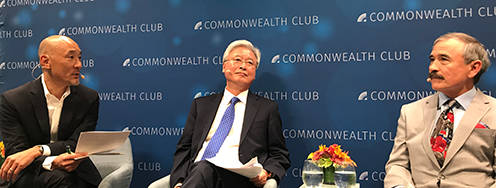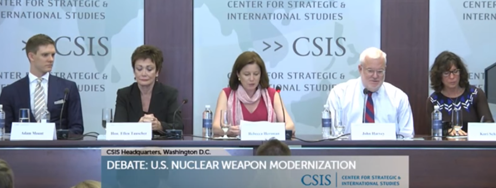Updating NATO's Nuclear Policy
NATO is finishing a review of its Strategic Concept before the Lisbon Summit next month. Ploughshares grantees Oliver Meier and Paul Ingram forecast the summit's proceedings and layout timely recommendations for updating NATO's nuclear posture in an article for Arms Control Today.
The Lisbon summit, set to take place on November 19-20, will largely deal with finalizing an update to the alliance's Strategic Concept. Within this strategic review lies an internal tension over NATO's role with nuclear weapons and missile defenses - with some countries lobbying to keep the nuclear status quo over others who urge disarmament. According to Meier and Ingram, the way to change the alliance's status quo policies is for NATO to conduct its own nuclear posture review. The authors hope such a review would help clarify NATO's Strategic Concept and align it with the long-term goal of eliminating nuclear weapons.
NATO Secretary-General Anders Fogh Rasmussen is looking to secure agreement on broad concepts and the general direction of NATO’s nuclear policy during the Summit. “It is for follow-up negotiations to produce more concrete facts and figures,” Rasmussen said in a September 7th briefing. Meier and Ingram also suspect that the Lisbon Summit could produce formal examinations of NATO’s declaratory policy and weapons sharing arrangements. These further investigations may lead to policy changes within 12 months.
Above all, Meier and Ingram see the Lisbon Summit as an important opportunity for NATO to throw its weight behind the goal of a nuclear-free world. NATO could use its status to build upon the current arms control momentum and also encourage further bilateral nuclear reductions between the US and Russia.
“The alliance can no longer avoid a fundamental reform of its nuclear weapons policy,” write Meier and Ingram. NATO has maintained an ambiguous nuclear posture for decades, reserving the right to use nuclear weapons in response to any kind of threat - nuclear or conventional. Meier and Ingram argue that “maintaining [this] first-use policy also would give the impression of obstinate resistance to the disarmament agenda for no good cause.”
Meier and Ingram explain that there is no debate about if NATO should remain a nuclear alliance - noting that the nuclear deterrent provided by the US, UK, and France will have a role for the foreseeable future. Instead, the authors are concerned with the effective and meaningful leadership role that NATO could be playing to advance the global arms control agenda.
Oliver Meier is an International Correspondent and Representative of the Arms Control Association and Paul Ingram is the Executive Director of the British American Security Information Council.



